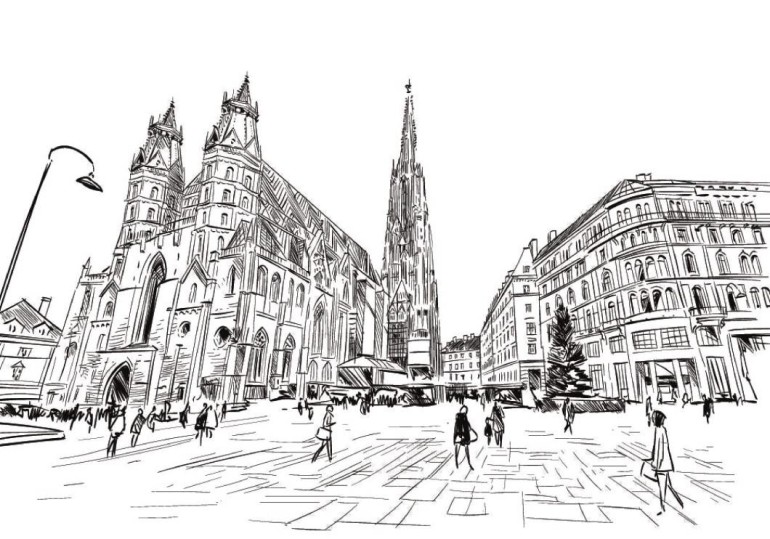Sponsored Listings:
Vienna tourism wants to move away from mass tourism in the future. Low-cost airlines are no longer advertised. In return, luxury travelers and congress tourists should generate more turnover – and travel by train.
Vienna should not become Venice – nor Barcelona, in other words: not a city in which the tourist masses are increasingly perceived as a burden.
At the same time, of course, they should continue to come, the visitors from all over the world (2018 there was another record with 16.5 million overnight stays), leaving money in the city and being viewed positively by the Viennese. For the coming years, Vienna Tourism has developed a “Visitor Economy Strategy 2025”, which redefines tourism under the motto “Shaping Vienna”.
The question, said Mayor Michael Ludwig, was no longer: “What can Vienna do for tourism?”, but rather: “What can tourists do for Vienna? Norbert Kettner, head of Vienna Tourism, calls the goals, which were worked out with 300 experts (from the hotel industry, gastronomy, and the districts, among others), “very, very ambitious. Possibly,” he says, “we will fail.”
“We want growth, but not at any price,” says Kettner. Everything that looks like mass tourism will be neither promoted nor supported by Vienna Tourism in the future, sometimes even criticized loudly. We could also become a spoilsport,” says Kettner, “if the quality of the public space suffers too much from rickshaws, street vendors or junk stands. “Mass tourism needs regulation, not marketing.”
Vienna wants to position itself as a premium destination in the future and above all address the luxury travelers and the (usually solvent) LGBT target.
For the first time, Vienna Tourism will be absent from the major international tourism exchange ITB in Berlin – but will be specifically present at smaller specialist trade fairs. With immediate effect, this is “really a very new approach”, the success of tourism is no longer measured by the number of overnight stays – which has been increasing in Vienna for years.
It is no longer a question of recording as many overnight stays as possible – at the same time, however, tourism should bring in even more money than before by 2025.

Net overnight sales are expected to rise by two thirds from currently around 900 million euros (2018) to 1.5 billion euros by 2025. Direct and indirect added value from tourism, which amounted to around four billion euros last year, is also expected to rise by 50 percent to six billion euros by 2025. An “incredible challenge,” says Kettner.
How can this be achieved? Finance City Councilor Peter Hanke believes that higher room prices are conceivable and that Vienna is still inexpensive by international standards. “There’s still air up there.”
Tourism in Vienna continues to concentrate too much on the city center. To ensure that the city center, which is heavily burdened by tourism, does not become a “pure tourism landscape, not a Disney City”, the intention is to bring guests to other districts in the future as well. “Guiding tourists through the city,” the mayor calls it.
We’re not telling where exactly yet. According to Kettner, there will be three or four clusters (i.e. city districts) that will be specifically advertised. “The Danube will play a role, forests, and wine, culture and shopping.”
The destinations are ambitious when it comes to the arrival and departure of tourists. 26 percent of the visitors currently arrive by car, only 21 percent travel by train. By 2025 it should be exactly the other way around. In cooperation with the ÖBB (Austrian Federal Railways) and private railway providers, the arrival by train is to be promoted in a targeted manner – also as an alternative to air travel. A train journey of five to six hours is reasonable, Kettner says. Currently, every second visitor arrives by plane, and 70 percent of congress tourists do.
Clearly, it will not work without air traffic in the future, but Vienna Tourism will advertise primarily long-haul flights in the future and will only cooperate with the so-called legacy carriers such as Austrian, and no longer with low-cost airlines. “A nine-euro ticket is neither economically, ecologically nor socially sustainable,” says Kettner.
With Paris and Barcelona, Vienna is one of the three strongest cities in Europe when it comes to congress tourism; every eighth overnight stay in Vienna is accounted for by congress participants. With the new brand “Meeting Destination Vienna”, Vienna is to be promoted even more as a venue for congresses.
International companies are also to relocate their company meetings to Vienna in the future. This is not only intended to strengthen Vienna’s reputation as a business location – but congress tourists are also so attractive because they spend around 540 euros a day, twice as much as the average visitor to Vienna.
Source: tourism-review.com










